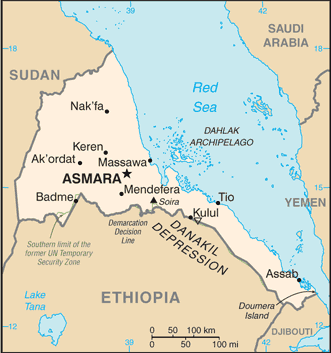Africa > Eritrea: Weather, Map, Costs and Travel Guide

Eritrea : When and where to go?
Click on a city for complete climate and weather tables
| Town | Jan | Feb | Mar | Apr | May | June | July | Aug | Sept | Oct | Nov | Dec |
| Asmara |  |  |  |  |  |  |  |  |  |  |  |  |
Eritrea: Climate & Weather
The country is divided into two major climatic regions: the coastal zone where the climate is desert, with very high temperatures reaching an average of 40 ° C in July / August and very little or no precipitation; The central highlands where the altitude of 2000 meters leads to a cool climate (20 to 25 ° C) and more rain. It is therefore possible to travel on the high plateaus almost all the year, avoiding July and August with their dense rains, while the coast will be visited rather between December and February not to suffer from the torrid heat.
Weather today

Clear
Wind: 3 km/h
Precipitation forecast: 0 mm
> Full report and 7-days forecast
Data updated at 02:51 (local time)
At that time, the weather was:
 12 °C / Clear
12 °C / Clear
Eritrea: Map

Sponsored links
What to do in Eritrea
By discovering Asmara, you will be able to admire the Art Deco villas and the markets where local products and some handicrafts are sold, then climb up the bell tower of the Cathedral of Santa Maria for a particularly beautiful panoramic view at sunset. Then head for the town of Massawa, passing by the rainforest of Filfil, and stroll through the harbor and into the old town, which is particularly attractive at sunset, where the animation gradually grows and you keep under its charm full of life and Of authenticity.
Do not miss a visit to the Dahlak Islands, embarking on a sambuk (the Eritrean dhow) on the Red Sea: this archipelago will offer you its white sand beaches, transparent sea and diving spots where you can admire corals of all colors , Turtles and fish of all kinds, all on almost deserted islands where you'll go for Robinson, especially when you roast your fish freshly caught by the waves before falling asleep under the starry sky.
Finally, you must attend a coffee ceremony, which is part of the country's important traditions: it is the women who take care of this ancestral ceremony that lasts about an hour, and this coffee will be offered to the guests and the members Of the family as a mark of hospitality: grilled grains in a pan, vapors offered to be felt by the hosts, sorting of grains, pounding in a mortar, infusion of grains in boiling water, multiple filtration, before serving in The small cups arranged on a tray. If you are invited, know that you will have to drink at least three cups so as not to be rude.
To be remembered whatever the place: the great hospitality of the Eritreans and their desire to share and communicate with the travelers.
Eritrea: The basics
The current currency is the Eritrean nakfa, or ERN.
You will arrive in Eritrea by plane, at the airport of Asmara (about 900 € for a Paris / Asmara).
To get around the country, there are buses that connect Asmara to the big cities, and you can also rent a car, preferably a 4WD because of the terrain, usually with a driver. There is also a tourist train that runs between Asmara and Massawa, only on Sundays, and if there are more than 10 interested travelers. Taxis are found in large cities, but prices are high.
The budget to be expected depends of course on your activities: you will be able to count about 40 € per day all included if you do not plan far excursions, and rather 150 € in the contrary case, if for example you plan to rent a boat in group To go to the Dalhaks.
As regards health, it is advisable to take a treatment against malaria before leaving and during the stay. Keep up-to-date your standard vaccinations, and add those for hepatitis A and B, typhoid and meningococcal meningitis. Avoid bathing in unsalted stagnant waters, as well as contact with dogs and cats that may carry rabies.
Security: it is not advisable to visit the Danakil region because of the presence of armed groups, as well as in border areas with Ethiopia and Sudan.



